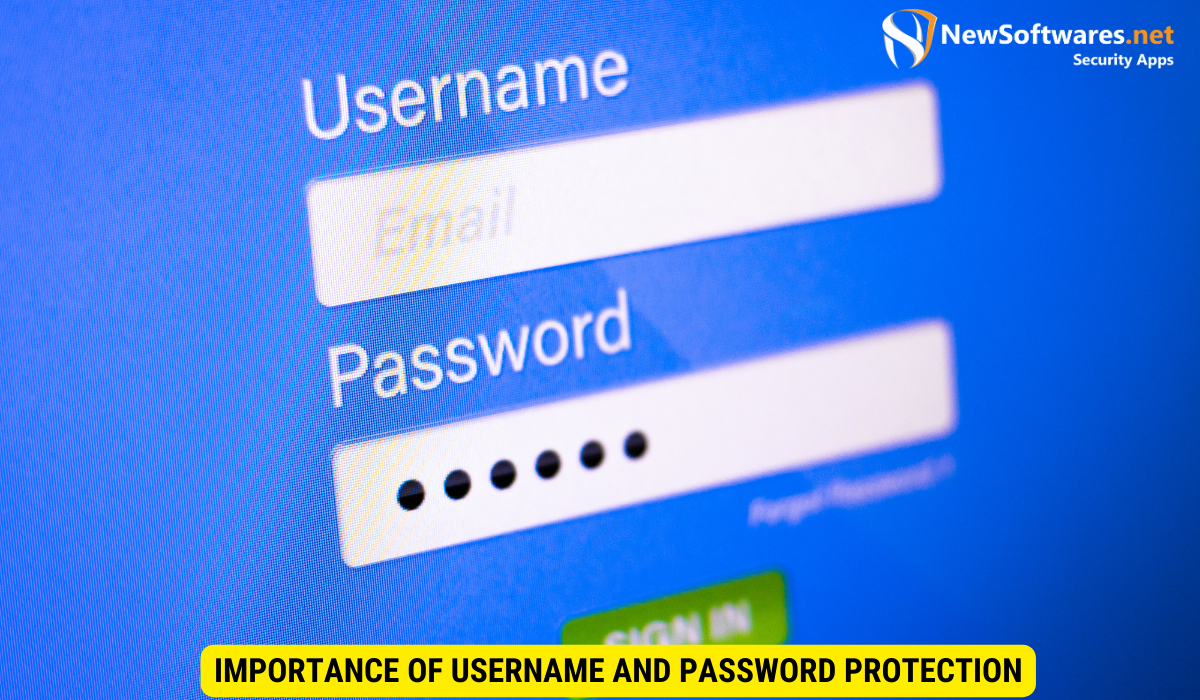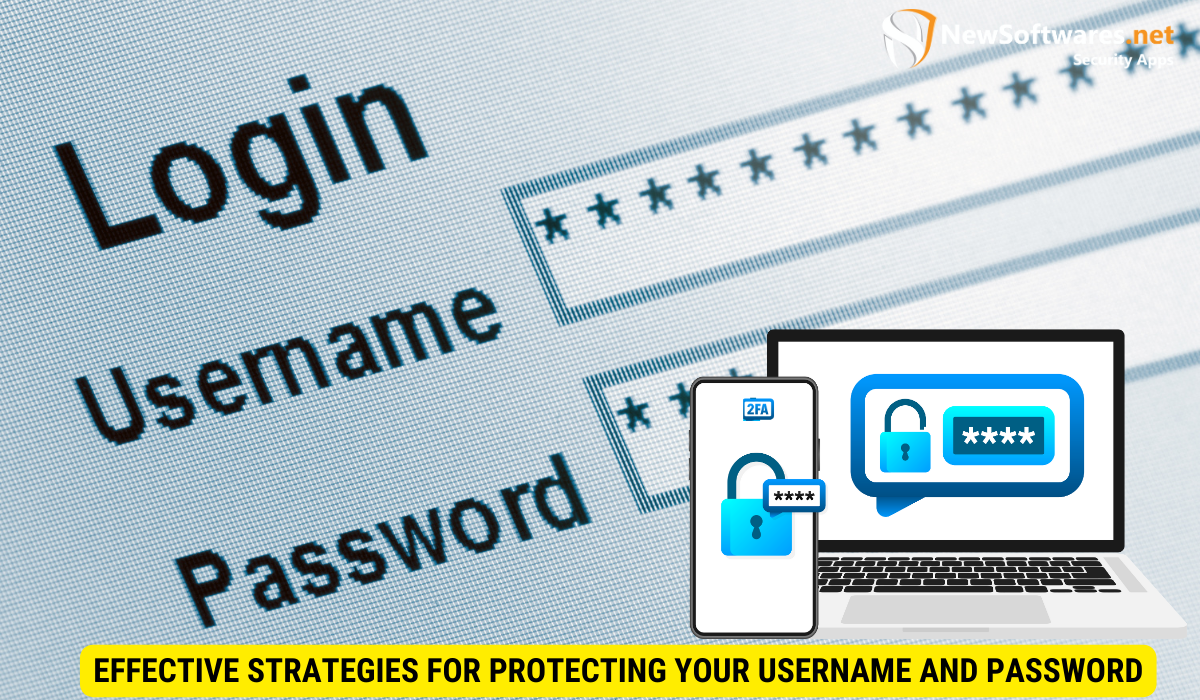Protecting your username and password information is crucial for ensuring the security of your online accounts and personal information. Neglecting username and password security can result in identity theft, unauthorized access, and potential financial loss. By utilizing strong usernames and passwords, avoiding common mistakes, and implementing effective strategies, you can enhance your digital security and minimize the risk of cyber threats.
In today’s digital age, protecting your username and password information is of paramount importance. With cyber threats on the rise, it is crucial to understand the significance of safeguarding your login credentials. Together, we will delve into the reasons why username and password protection should be a top priority and how you can take proactive measures to ensure the security of your online accounts.
Importance of Username and Password Protection

Digital security begins with the use of strong usernames and passwords. These login credentials play a vital role in safeguarding your personal and sensitive information. By keeping your usernames and passwords secure, you can prevent unauthorized access to your accounts and protect yourself from identity theft, financial fraud, and other cybercrimes.
Without the proper protection, your online accounts, including email, social media, and banking, are vulnerable to exploitation by hackers and cybercriminals. It is crucial to recognize the significance of username and password protection to avoid falling victim to these malicious activities.
The Role of Usernames and Passwords in Digital Security
Your username acts as your unique identifier, allowing you to access various online services. Meanwhile, your password serves as a barrier, ensuring that only individuals with the correct credentials can gain entry to your accounts. Together, they create a two-step authentication process that establishes your identity and verifies your authorization.
When creating a username, it is important to choose something that is not easily guessable or linked to your personal information. Avoid using common names or easily identifiable information such as your birthdate or address. Instead, opt for a combination of letters, numbers, and special characters that are not easily associated with you.
Similarly, when it comes to passwords, it is crucial to create strong and unique combinations for each of your accounts. A strong password typically consists of a mix of uppercase and lowercase letters, numbers, and special characters. Avoid using common passwords like “123456” or “password,” as these are easily cracked by hackers.
By employing a strong and unique combination of usernames and passwords for each of your accounts, you enhance your digital security and minimize the risk of unauthorized access. This adds an extra layer of protection against brute force attacks, where hackers attempt to guess your login details by systematically trying different combinations.
Potential Risks of Neglecting Username and Password Security
Neglecting to protect your usernames and passwords can have severe consequences. One of the most significant risks is the potential for identity theft. If a cybercriminal gains access to your account, they can exploit your personal information, such as your name, address, social security number, and credit card details. This information can then be used to commit fraud, open fraudulent accounts, or make unauthorized transactions in your name.
Additionally, compromising your username and password can lead to the unauthorized disclosure of sensitive data, including personal and professional communications, confidential documents, and proprietary information. Such incidents can result in reputational damage, financial loss, and legal complications.
Furthermore, neglecting username and password security can also have a domino effect, compromising not only your own accounts but potentially spreading to other interconnected systems. Cybercriminals often employ tactics such as password reuse, where they use the same login credentials across multiple platforms. If one account is compromised, it can provide a gateway to other accounts, amplifying the damage caused.
It is essential to prioritize the protection of your usernames and passwords. Regularly update your passwords, enable two-factor authentication whenever possible, and remain vigilant against phishing attempts and suspicious activities. By taking these precautions, you can significantly reduce the risk of falling victim to cyber threats and ensure the safety of your digital presence.
The Anatomy of Strong Usernames and Passwords
Creating strong usernames and passwords is essential for effective online security. To build a robust defense against cyber threats, you must understand the characteristics of a strong username and the essential elements of a secure password.
Characteristics of a Strong Username
A strong username should be unique and discreet. Avoid using easily guessable names or information, such as your birthdate, name, or phone number. Opt for a username that is unrelated to your personal details and difficult for others to associate with you. Furthermore, it is advisable to refrain from sharing your username publicly or using it for various online accounts to minimize the risk of being targeted by malicious individuals.
Essential Elements of a Secure Password
Creating a secure password is crucial for protecting your online accounts. Follow these guidelines to build a robust password:
- Length: Choose a password that is at least 12 characters long. The longer your password, the more difficult it is to crack.
- Complexity: Include a combination of uppercase and lowercase letters, numbers, and special characters. Avoid using common words, dictionary terms, or easily guessable patterns.
- Uniqueness: Each of your passwords should be unique to prevent password reuse. Applying the same password across multiple platforms increases the risk of multiple accounts being compromised if one password is exposed.
- Regular Updates: Change your passwords regularly, ideally every few months. This minimizes the likelihood of unauthorized access to your accounts.
Common Mistakes in Username and Password Management
While understanding the importance of username and password protection is crucial, it is equally important to be aware of common mistakes that can compromise your digital security.
Reusing Passwords Across Multiple Platforms
Many individuals make the mistake of reusing passwords across various online platforms, assuming that it is easier to remember. However, this practice poses a considerable risk. If a single account is compromised, hackers can gain access to other accounts that share the same password. It is crucial to use unique passwords for each online service you utilize.
Oversharing Login Information
Sharing your login information, whether intentionally or unintentionally, can lead to unauthorized access to your accounts. Be cautious about disclosing your usernames and passwords, even to friends, family members, or colleagues. Additionally, avoid using public computers or unsecured networks to log in to sensitive accounts, as they may compromise your information.
Effective Strategies for Protecting Your Username and Password

To enhance the security of your login information, consider implementing the following strategies:
Using Password Managers for Enhanced Security
Password managers are tools designed to securely store and generate unique passwords for each of your accounts. These managers encrypt your login information and require you to remember only one master password. By utilizing a password manager, you can create complex and unique passwords while alleviating the burden of memorizing them.
The Benefits of Two-Factor Authentication
Two-factor authentication (2FA) provides an extra layer of security for your online accounts. With 2FA enabled, you will be required to provide a second form of verification, such as a unique code sent to your mobile device, in addition to your username and password. This added step adds another level of protection, even if your login credentials are compromised.
The Future of Username and Password Protection
The field of digital security continues to evolve as technology progresses. As concerns regarding username and password security grow, new methods and technologies are being developed to enhance digital authentication.
Biometrics and the Evolution of Digital Security
Biometric authentication involves using unique physiological or behavioral characteristics, such as fingerprints, iris scans, or facial recognition, to verify a user’s identity. Biometrics offer a high level of security since these characteristics are difficult to replicate, making it challenging for cybercriminals to gain unauthorized access to accounts.
The Rise of Passwordless Authentication Methods
As passwords prove to have limitations in terms of security, convenience, and memorability, passwordless authentication methods are gaining traction. These techniques leverage alternative authentication factors, such as biometrics, push notifications, or hardware tokens, to provide users with a seamless and secure login experience.
Key Takeaways
- Username and password protection is essential for safeguarding your personal and sensitive information.
- Strong usernames and passwords create a two-step authentication process, enhancing your digital security.
- Neglecting username and password security can lead to identity theft, data breaches, and financial loss.
- Utilize unique and complex usernames and passwords for each of your online accounts.
- Implement password managers and two-factor authentication to enhance your login security.
FAQs
Why is username and password protection important?
Username and password protection is crucial for securing your online accounts and personal information. Without proper protection, your accounts are vulnerable to unauthorized access and potential financial loss.
What are the risks of neglecting username and password security?
Neglecting username and password security can result in identity theft, data breaches, and unauthorized access to your personal and financial information.
How can I create strong usernames and passwords?
Create strong usernames by avoiding easily guessable information and refraining from sharing them publicly. Build secure passwords by ensuring they are unique, complex, and regularly updated.
What are some common mistakes in username and password management?
Common mistakes include reusing passwords across multiple platforms and oversharing login information with others.
What are effective strategies for protecting my username and password?
Consider using password managers to generate and store unique passwords and implementing two-factor authentication for an added layer of security.
Conclusion
Protecting your username and password information is not only necessary but critical in today’s digital landscape. By understanding the importance of username and password protection, recognizing potential risks, and implementing effective strategies, you can safeguard your online accounts and personal information from cyber threats. By prioritizing the security of your login credentials, you take an important step in securing your digital identity and maintaining your online privacy.
